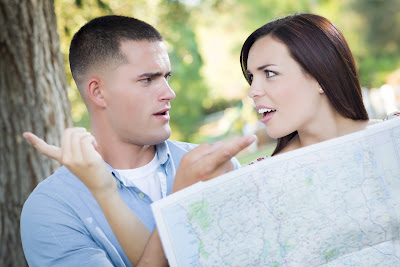How and why people get lost when hiking

Avoid getting lost by being proactive when on the trail.
And how to not make their errors
Among the greatest dangers of hiking is getting lost. Panic often sets in when this happens, which in turn results in bad decision-making that can lead to getting further lost, an injury, and even death. One way to keep from getting lost is to think about how people end up in that situation. You can take preemptive steps to avoid making the same mistake.
The main reason people get lost is that they
turn onto the wrong trail. This happens in a couple of ways. First, they simply aren’t paying close attention and so go onto the wrong trail. Secondly, they take a false trail, such as misinterpreting an animal trail for a human one. To avoid either error, always familiarize yourself with the trail via maps and satellite photos before setting out on the hike. Then bring a topo map and compass with you. Lastly, constantly consult your map and compass while on the trail, so that you know where you are and what’s the next waypoint; especially do this before making any turns onto another trail.
Another common reason people get lost is because
they leave the trail. There may be an obstacle such as a fallen tree they must walk around. Or perhaps they take a break to swim. Or maybe they want to see some rock formation or waterfall that is just off the trail. Before leaving the trail, always consult your map and compass to know where you’re at. Chart as straight of a course as you can to where you want to go. When you get to your destination (the swimming hole, waterfall, etc.), look back and see how you came from the trail to where you’re standing. Use the exact same route when returning to the main trail.
A variant of this is when people
take a shortcut. Even if you have a map, cutting across a woods or around a hill to save you time typically results in a longer hike, both in time and distance. Usually trails weren’t built where the “shortcut” is because that way wasn’t easy to pass through, meaning it’s likely swampy and probably won’t be a straight shot. Without a trail on a map to help you determine where you’re at, you easily can get turned around and end up disoriented. Instead, always stay on the trail.
One more reason hikers get lost is night falls before they’ve reached their destination, so
the trail is too dark to see. The quick solution is to determine how long you will need to reach a destination before setting out. Most hikers can cover a couple of miles per hour. So if the trail is four miles long, plan a two-hour trip one-way. Before going on the hike, check to see when sunset is. If it’s at 8:30 p.m., then leaving anytime after 6 p.m. is a risk just to go one-way. Instead, shorten the hike to two miles or simply wait until another day. Lastly, always carry a flashlight in your backpack, just in case.
A less common way people get lost is they must cross rocks or a creek in which there are
no bootprints to follow. There’s a certain comfort in seeing fresh treadmarks on a trail; you know that at least others have gone that way recently. When those treadmarks are gone, you may feel like you’re guessing which way to go. Before crossing rocks or a creek, instead try to visually identify where you are to come out on the other side and keep you eyes locked that point as you cross. Barring that, always consult your map and chart a course. Also, look for cairns which can guide you to your destination.
Another reason people get lost is a
sudden change in the weather. Rain and particularly snow can obscure points on the horizon that you need for keeping track of your course; they also can make the trail confusing to follow. Always check a weather report in advance of setting out on a trail, especially if in the mountains. At the first sign of inclement weather, turn back and avoid making cardinal errors of taking a shortcut or skipping a map reading just to save you time.

